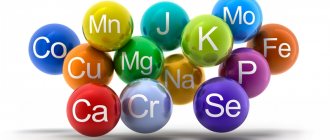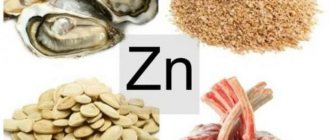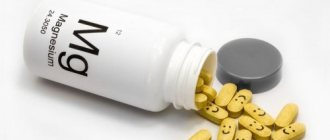Gastritis
Pancreatitis
Worms
3503 January 20
IMPORTANT!
The information in this section cannot be used for self-diagnosis and self-treatment.
In case of pain or other exacerbation of the disease, diagnostic tests should be prescribed only by the attending physician. To make a diagnosis and properly prescribe treatment, you should contact your doctor. We remind you that independent interpretation of the results is unacceptable; the information below is for reference only.
Vitamin B12: indications for prescription, rules for preparing for the test, interpretation of results and normal indicators.
Chemical properties and composition of vitamin B12
To be precise, this is not one substance, but several compounds combined into one general group and designated by a letter of the Latin alphabet. These biologically active components contain cobalt, which is necessary for the normal functioning of many processes in our body:
- hematopoiesis;
- regeneration of cells and tissues;
- prevention of disorders in the functioning of the pancreas;
- regulation of the production of the hormone adrenaline.
Vitamin B12 itself, the lack of which can have a detrimental effect on health, from a chemical point of view, is two varieties of the same cobalamin molecule. Both options are also called vitamers. Their correct designations among scientists and doctors are cyanocobalamin and hydroxocobalamin.
Not all components of this substance can have a beneficial effect on your health and general condition. Only its active forms are of benefit to humans. These compounds are formed from vitamers - methylcobalamin and deoxyadenosylcobalamin. When we tell you what foods contain vitamin B12, we mean these active forms. Such names are not easy for an ordinary person not involved in chemistry to remember, so in the future, throughout the entire text of the article, we will use the usual and familiar letter name of the biologically active substances of this group.
Interaction of B12 with other elements
Cyanocobalamin interacts poorly with some other vitamins, but there are also elements that increase its effectiveness. One of these is folic acid. If there is insufficient vitamin B12, this also affects the level of folic acid, since it remains in the body in an unusable form.
Another vitamin with which cyanocobalamin interacts is B7. Even with a sufficient amount of cyanocobalamin in the body, symptoms characteristic of deficiency may occur, which are caused by a lack of biotin (B7). For this reason, biotin is recommended to be taken during stress and physical activity.
Recommended video:
Vitamin B12 is absorbed by the intestines due to calcium, so such elements have a direct relationship. In some cases, with calcium deficiency, a loss of a small amount of cyanocobalamin is also observed. For example, with poor nutrition, acidity in the stomach increases, which provokes the neutralization of acid by consumed calcium. As a result, B12 absorption is impaired.
Vitamin B12: indications for use
This substance in a certain volume and quantity is useful to everyone, without exception, for the normal functioning of vital organs and systems, and maintaining a healthy state of the body. There are also cases when its use is not only recommended, but also necessary to prevent the risk of developing serious diseases. Here are the most common situations when it is necessary to make up for the B12 deficiency:
- Addison-Beermer disease;
- various types of anemia: chronic, caused by iron deficiency or toxic substances;
- liver diseases: failure, cirrhosis;
- treatment of the consequences of alcoholism
- skin diseases: psoriasis, dermatitis
- neuroses;
- atherosclerosis;
- arthritis;
The substance has homeopathic and metabolic effects, has a positive effect on the liver, nervous system and accelerates regeneration. It can stop the development of these diseases and prevent the risk of complications. The drugs are available in various forms, and you can find many options in pharmacies. There are tablets, liquids and concentrated injection solutions. Each type has its own purpose and certain limitations. Without the advice of a specialist, it is difficult to navigate them and choose the right one, so be sure to consult with your doctor before you start taking them. He will tell you and explain in detail which form is right for you, help you decide on the dosage and give recommendations on how best to use the drug: subcutaneously, intravenously or intramuscularly.
How to preserve the beneficial properties of food
Changes in the beneficial properties of vitamin B12 occur under the influence of culinary processing of the corresponding products. Whether they decrease or increase can be determined based on the method of preparation. For example, better absorption of food that contains cyanocobalamin occurs if it is consumed in boiled form. Fried foods, on the contrary, lose a valuable element and are considered less healthy.
The full amount of element B12 in beef after roasting is retained for 45 minutes. If you boil milk, the vitamin is retained only for 5 minutes after removal from heat.
Why does the body need vitamin B12?
This substance plays a significant role in all vital processes occurring in our body. It’s not for nothing that hypovitaminosis, a lack of vitamins, is considered a serious disorder that doctors advise to eliminate immediately. The full list of functions that this group of connections performs is very large; here we will list only the most important and basic:
- Regulates the production of red blood cells: promotes formation, prevents their destruction and shortage.
- Positively affects the process of hematopoiesis.
- Promotes complete absorption of protein by the body.
- Improves tissue regeneration of the liver, kidneys, and heart.
- Prevents the development of diseases in these organs.
- Protects the nervous system from destruction and the harmful effects of external and internal adverse factors.
- Preventing the occurrence of anemia.
- Normalizes the functioning of enzymes.
- Activates cell division.
It is especially worth noting its ability to cover nerve cells with the myelin sheath, which is necessary for their complete and reliable protection. This is a unique function of vitamin B12. Other substances are not able to form, form and maintain the presence of this shell. This property of B12 can be a real salvation for you if your work and lifestyle involve constant nervous tension and stress. By taking your daily dose of the vitamin, you will protect yourself from depression, depression, irritability, mood swings and aggression, which can so often be found among residents of modern large cities.
People working in leadership positions who are under stress due to a high degree of responsibility and a large volume of tasks are especially susceptible to nervous disorders. This is also true for those who are exposed to the human factor: teachers, doctors, service workers. It would also be useful to take preventive measures for students during the period of taking exams and preparing for them.
3. Symptoms and diagnosis
The clinical picture of hypovitaminosis B12 is polymorphic, it significantly depends on the degree of deficiency, but, as a rule, serious disorders occur simultaneously in several body systems.
Thus, from the central nervous system, there is a symptom complex of chronic fatigue, frequent headaches and vestibular disorders, depressive-dysthymic disorders, decreased intellectual and mental productivity, various neurological syndromes, paresthesia and muscle pain in the lower extremities; in the most severe cases – amnesia and hallucinatory inclusions.
From the gastrointestinal tract - constipation, hepatomegaly, gastroduodenitis and gastroduodenal ulcers.
On the part of the hematopoietic system - anemia and its secondary consequences: glossitis, focal skin lesions (especially in the distal extremities), disturbances in the trophism of the brain and spinal cord (which has an extremely negative effect on psychophysical development in childhood).
From the cardiovascular system - a tendency to hypotension and the development of atherosclerosis.
From the musculoskeletal system – osteoporosis (tendency to thinning and increased fragility of bone tissue).
Even with a slight deficiency of vitamin B12, hair becomes brittle, dandruff appears, and the fluid balance of the skin is disrupted.
Patients with HIV/AIDS are advised to maintain increased concentrations of B12; otherwise, the rate of progression almost doubles. A similar trend is found for other chronic diseases.
The diagnosis is established by a set of characteristic clinical manifestations in comparison with the medical history (first of all, the patient’s usual diet and the composition of the long-term medication regimen are important). As necessary, special laboratory blood tests, bone marrow puncture and other studies may be prescribed.
About our clinic Chistye Prudy metro station Medintercom page!
Who should definitely take B12?
For an adult, the standard daily requirement for B12 is about 2.4 mcg. But it is worth remembering that this amount is only valid for those who are not subject to nervous shock and do not have bad habits or excessive stress. During times of stress, nicotine addiction, increased workload and fatigue, this figure can increase in the range of 10 to 20%. In such cases, we advise you to choose foods that are rich in vitamin B12 and contain it in large quantities. We have listed cases in which the need to take the substance increases:
- for those who are actively involved in sports, especially professional athletes;
- if your job involves heavy physical activity;
- undergoing rehabilitation after alcohol addiction;
- pregnant and lactating women;
- during puberty in adolescents
- children in the period of active growth;
If you belong to any category from this list, you should be especially careful to ensure that your body receives all the necessary substances. A diet that includes healthy, vitamin-rich foods, as well as proper intake of medications prescribed by your doctor, is a guarantee of your impeccable health, beauty and youth for many years.
Causes of deficiency
The lack of cyanocobalamin in the body is caused by 2 main factors:
- failure to maintain proper nutrition;
- poor absorption of the element in the body, which is caused by a lack of stomach acids.
In addition, the reasons for the insufficient content of the element in the body include surgical intervention - a history of resection of the ileum or part of the stomach. This also includes the development of certain intestinal diseases (for example, Crohn's disease), accompanied by impaired absorption of nutritional components.
Other reasons include: therapy with medications that reduce the acidity of gastric juice, insufficient absorption of the element by cells, the presence of helminthic infestations in the body, periods of increased need for cyanocobalamin (pregnancy, etc.).
Vitamin B12 deficiency: symptoms of deficiency
From time to time, a lack of nutrients - hypovitaminosis - occurs in many people. This is especially true in the autumn-winter season, when there are fewer sources of vitamins and the stress load on a weakened body increases. You should not be afraid of this, because such phenomena are quite natural. It is only important to identify its symptoms in time and take measures to eliminate the deficiency. Then no harmful consequences will arise.
You should think about a lack of B12 compounds if you have:
- Blood clotting has worsened.
- The tongue became unnaturally red and dry.
- Difficulty swallowing.
- Itching on the scalp, dandruff and flaking appeared.
- The menstrual cycle is disrupted.
- The legs and arms often go numb, and there is a feeling as if someone is crawling on the skin.
- Depression and depressed mood are observed.
- Fatigue has increased.
- The skin has become pale or acquired a yellowish tint.
- Disorders of the cardiovascular system.
- Slow heart rate.
- Feels drowsy and tired.
- Diarrhea.
- Hair is brittle and falls out a lot.
- Small wounds and ulcers form on the mucous membranes.
- Dizziness
Of course, individually, these symptoms may be signs of other diseases, but if you observe several manifestations at once, this may be hypovitaminosis. It is easy to deal with it by consulting a doctor for advice. People at risk need to be especially careful. They lack this vitamin more often than others.
In what cases does this happen:
- during pregnancy and lactation
- for lupus
- while taking hormonal contraceptives
- if there are parasites in the body
- alcohol abuse
- during gastrectomy
- strict diets and food restrictions
- refusal of meat and other animal products: veganism, vegetarianism, raw food diet
- nicotine addiction
- for gastritis
- in old age
- with changes in intestinal microflora
- with Graves' disease
Insufficient amounts of B12 can also be negatively affected by factors such as long-term use of certain diabetes medications. The substances contained in them interfere with absorption. Hypovitaminosis is also possible in people suffering from diseases of the gastrointestinal tract. In this case, even if B12 enters the body, the internal organs are not able to absorb it. Talk about this with a specialist who is aware of your medical condition. He will prescribe you medications to compensate for the lack of B12. Their regular intake, combined with a properly selected diet and a balanced diet, will help you feel much better within two to three weeks. If you constantly postpone prevention, you can get serious diseases, the treatment of which will require much more time, money and effort.
These include:
- anemia
- nervous system disorders
- blurred vision
- Crohn's disease
- skin diseases
- memory impairment
- poor digestibility of food
- loss of appetite
- multiple sclerosis
Protect yourself and your loved ones from the consequences of hypovitaminosis, prevent the occurrence of dangerous diseases and their development. Prevention, as we know, is much better than long and complex treatment. All you need to do is undergo a medical examination on time, be examined by specialists, take the necessary tests, and also monitor your diet and the diet of your family members. To do this, you need to know what foods contain and where vitamin B12 is found. We have compiled a list for you that will help you develop your daily menu and make your diet balanced and nutritious.
Why does excess vitamin B12 occur?
Let us clarify once again: its excessive accumulation in the plasma of constantly circulating blood is practically impossible, although it does occur in clinical practice. But cases of hypercobalaminemia are always preceded by one of the transport disorders of this vitamin - the nutritional compound is delivered to the cells using transcobalamins. These are proteins that bind up to 80% of b12 so that the nutrient is delivered to targets with minimal loss and provide the vitamin with optimal uptake by tissues and the liver.
An exceptional fact: of all the water-soluble vitamins, only Cyanocobalamin has the ability to be slightly synthesized in the body and accumulate in the liver. Apart from b12, no other type of B vitamins has such properties.
Why does excess Cyanocobalamin accumulate?
- Excessive consumption of vitamins, duplication of b12 in different compositions
This phenomenon cannot be called widespread, since even when the vitamin is prescribed in different dosage forms (for example, injections against the background of self-administration of nutrients), the compound is constantly excreted through the urinary system.
- Release of the vitamin from the internal depot (liver) while taking nutrient complexes
Since b12 is the only water-soluble vitamin that can accumulate in the liver, during temporary or chronic diseases the nutrient may be released. With a simultaneous course of taking Cyanocobalamin, a temporary excess in the blood plasma may occur.
- Violations of vitamin excretion and its binding functions
In this case, it is worth suspecting pathologies of the liver and kidneys, as well as the inability of the vitamin to bind to proteins that act as a carrier of nutrient compounds.
How it works
A sufficient amount of vitamin B12 for metabolic balance can only be obtained through food: a varied diet and/or intake as part of nutrient complexes. In the body, multiple biochemical reactions occur with Cyanocobalamin, starting from entry into the stomach. At the moment when b12 is in the blood, about 30% of its volume will react with transcobalamins responsible for delivery, and the rest will react with other proteins.
The norm is when the transport protein receives cobalamin, carries it to the cell, and gives it to the cell.
Pathology - the transport protein performs the main part of this program, but for some reason cannot give b12 to the cell. There is an “overload” of the transport protein with the vitamin, so the nutrient becomes more and more in the blood plasma. There may also be a lack of production of the transport proteins themselves.
Failure in the production of transport and binding proteins is one of the reasons for the rare, but still existing hypercobalaminemia syndrome.
Due to the insufficient spread of the syndrome, understanding all the mechanisms leading to increased concentrations of the antianemic vitamin is still difficult. However, available data indicate a close connection between hypercobalaminemia and congenital disorders of transport and binding proteins.
Studies confirm the close connection between high levels of vitamin B12 and malformations of the nervous system and hematological disorders. That is, the early stages of a number of diseases can be recognized by the level of Cyanocobalamin. Disorders of transport or the production of transport proteins themselves are hereditary.
How to find out your vitamin B12 level – are there any symptoms?
We would like to draw your attention to the particular importance of the information - hematopoiesis processes are closely related to vitamin B12, the nutritional compound is an external Castle factor. Simply put, this is the name for all substances that stimulate and support hematopoiesis, that is, the production of blood cells.
Any group of vitamins that deviate significantly from normal levels will activate symptoms associated with the underlying activity of the compounds. Regarding Cyanocobalamin in high concentrations, these are symptoms accompanying hematological pathologies, liver diseases - cirrhosis, hepatitis, etc.
The simplest, most accessible and reliable method of monitoring vitamin levels is blood tests. To monitor vitamin B12 levels, three types of studies are used:
- Biochemical - among all parameters, the level of certain nutrients is assessed, among which the concentration of b12 is mandatory;
- Total vitamin B12 level - this test can be performed separately, shows the content of the nutrient in the blood serum;
- Holotranscobalamin – HoloTC or active B12, that is, the biologically active form already associated with the transport protein.
For any deviations from the norm, upward or downward, it will be necessary to find out the reasons - what exactly led to the imbalance of the vitamin. In case of high indicators, additional types of examinations are prescribed: liver health, diagnostic screening of hereditary factors, etc.
If hyperconcentration of cobalamin is a rather rare phenomenon, then you are more likely to encounter a vitamin in the deficiency phase. Vitamin deficiency can be determined using the same tests, but focusing only on symptoms is not the most reliable method, since signs of B12 deficiency appear already in the later stages.
A deficiency of Cyanocobalamin requires close attention because the unique characteristics of this vitamin allow it to accumulate in the liver and be released into the blood when necessary. If reserves are depleted and the external supply of nutrients is reduced, tests are prescribed that will help explain this phenomenon.
B12 overdose
Of course, you shouldn’t abuse this substance either. Moderation must be observed even in the most useful products and preparations. Uncontrolled use will only harm your body and certainly will not be beneficial. Hypervitaminosis – overdose, manifests itself in the following symptoms:
- Pain and stabbing on the left side of the chest, near the heart
- Increased excitability of the nervous system
- The number of heart beats per minute increases
An overdose of B12 will not bring serious, dangerous, or even fatal consequences, since this vitamin is water-soluble. Its excess easily leaves your body through urine. But still, this process requires a certain amount of time, and during this period hypervitaminosis can harm your body. Therefore, you should refrain from increased use of dietary supplements and vitamin complexes. If you buy the drug at the pharmacy, strictly follow the instructions and strictly observe the dosage. If you notice side effects, a deterioration in your general condition and well-being, temporarily stop using the complex and immediately consult a doctor. Do not resume the course until your specialist gives you permission.
Daily requirement for different ages
The human body needs a certain daily amount of vitamin. The need depends on age and gender, which can be placed in the table:
| Age | Floor | Daily volume |
| Newborn children (up to 6 months) | Any | 0.3-0.4 mg |
| Newborn children (up to 12 months) | Any | 0.5 mg |
| Children from 1-3 years old | Any | 0.7 mg |
| Children from 3-7 years old | Any | 1.5 mg |
| Children from 7-11 years old | Any | 2 ml |
| Teenagers from 11-18 years old | Male | 3 mg |
| Teenagers from 11-18 years old | Female | 3 mg |
| Adults | Any | 3 mg |
| Pregnant | 3.5 mg | |
| While breastfeeding | 3.5 mg |
Where and what does vitamin B 12 contain: a list of foods for every day
The benefits and role of vitamin-containing products for a healthy and beautiful body cannot be overestimated. Long silky hair, strong nails, smooth skin, a clear mind and excellent memory - all this provides us with excellent health and a great mood at any time of the year and even on the cloudiest day. A balanced and proper diet gives a surge of vitality and increases performance. A person who does not experience a deficiency of nutrients, compounds and vitamins is less likely to get sick during an exacerbation of colds. He is strong, full of energy and resilient to physical and mental stress, much less susceptible to stress and seasonal depression. In addition, including healthy compounds in your daily diet helps maintain body health, youth and beauty even in old age.
What should you include in your daily menu to prevent vitamin deficiency? To answer this question, we have compiled a list of the richest and most complete food sources of B12 for you.
Meat and offal
- Beef
- Beef liver
- Beef kidneys
- Beef tongue
- Beef heart
- Lean parts of pork
- Pork liver
- Mutton
- Game
- Chicken liver
- Rabbit
- Liverwurst
Chicken eggs, or more precisely, the yolks, also contain large amounts of B12.
Seafood
- Crab
- Octopus
- Shellfish
- Scallops
- Oysters
Fish
- Mackerel
- Perch
- Trout
- Chum salmon
- Sardine
- Herring
Dairy
- Cheese
- Milk
- Cottage cheese
- Kefir
- Sour cream
- Natural yogurt
- Curdled milk
Plant products
- Soya beans
- Green onions
- Salad leaves
- Spinach
It is important to remember that by limiting your intake of animal foods, the risk of developing B12 deficiency increases. In plant sources it is contained in small quantities and does not cover the daily requirement. Therefore, vegetarians should consult a specialist who will prescribe a course of necessary medications.
Author: Di&Di Corporation
Clinical researches
The conducted clinical study proves the high efficiency, safety and tolerability of products for daily skin care with mild and moderate forms of atopic dermatitis and during remission, accompanied by a decrease in the quality of life of patients. As a result of therapy, a decrease in the activity of the inflammatory process, a decrease in dryness, itching and flaking was noted.
It has been proven that the cream for sensitive skin:
- reduces itching and irritation;
- relieves redness;
- moisturizes and gently cares for the skin.
The properties of the products are confirmed by a clinical study conducted jointly with the St. Petersburg Union of Pediatricians of Russia.
Sources:
- Molochkova Yulia Vladimirovna, Dermatology. Brief reference book, GEOTAR-Media, 2022.
- Baumann Leslie, Cosmetic Dermatology. Principles and practice, MEDpress-inform, 2016.
- Ratner Desiri, Avram M.R., Avram M.M., Procedures in Dermatology. Clinical cosmetology, GEOTAR-Media, 2022.
Photos of vitamin deficiency
You can see photos of vitamin deficiency on our website.
Photo album on the diseaseExcess cyanocobalamin
Excessive levels of element B12 in the body, for example, when taking appropriate vitamin supplements, causes increased blood clotting, allergic reactions and increased excitability. Sometimes an excess of vitamin leads to the development of acne.
When cyanocobalamin is injected in a dosage exceeding the required volume of the element entering the body, severe consequences develop. These may be symptoms of heart failure, thrombosis, or pulmonary edema.
In any case, only a doctor can determine the advisability of taking synthetic supplements containing the element. This also applies to the abuse of natural products, to which a negative reaction of the body may develop. Therefore, before taking this or that remedy, it is necessary to consult a specialist.
Recommended video:











